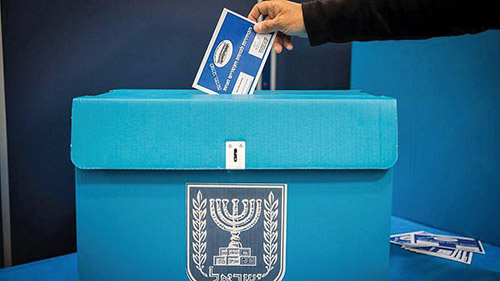
While many in Israel bemoan the financial burden of the new elections this fall, the major cost to the country will likely lie in other realms.
Israel’s 21st Knesset voted to disperse itself on May 30, just one month after its inauguration. Israeli Prime Minister Benjamin Netanyahu failed to piece together a government and chose to call for new elections rather than give another Knesset member the opportunity to try.
What does the new election—Israel’s second in six months—mean for the country?
According to Deputy Minister Michael Oren, Israel’s former ambassador to the United States, while the September elections will come with a hefty price tag, their greatest cost will not be financial in nature.
Oren told JNS that “Israelis, like so many in the world today, are experiencing a crisis of [belief] in national institutions. The authority of the judicial system, the press and the police is being questioned as never before.” But it is the political echelon, he said, that suffers from the most profound credibility problem, adding that “the failure of political leaders to form a government and their decision to go once again to elections further deepens this crisis.”
The true challenge, said Oren, will be to “restore our citizens’ faith in the Knesset and its majority coalition” after the Sept. 17 elections.
As for the economic cost, Bayan Wattad of the Finance Ministry’s budget division warned back in May that “a source does not exist” within the state budget for funds to cover the cost of the new elections. The money, he said, would therefore have to be found by “reducing government activity.”
The direct cost to the Israeli government for new elections, including a budget for the central elections committee and state funding for parties running in the elections, is estimated at NIS 800 million ($220 million). There is also the indirect cost of government workers, like Knesset members themselves, who are getting paid but aren’t doing any work, which is more difficult to assess.
The greatest loss, however, arises due to the fact that election day is an official vacation day in Israel. The country’s daily GDP is approximately NIS 5 billion ($1.4 billion), and according to conservative estimates, election day represents a loss to the Israeli economy of some NIS 1.5 billion ($410 million). This means a cumulative loss of nearly NIS 2.5 billion ($700.3 million), with close to 1 billion of that coming directly from the government.
‘Harms the Stability of Business’
Despite the seemingly hefty price tag, however, Professor Yedidia Stern, vice president for research at the Israel Democracy Institute and a professor of law at Bar-Ilan University, told JNS that ultimately the new election won’t really cost the state anything.
“Had a new government been formed,” he explained, “the state budget would have increased, as each party would have asked for large budget increases for their ministries as a condition to enter the government. Since a new election was called, all ministry budgets remain stagnant and are prorated based on the last budget approved by the last government. So it actually evens out from a purely economic outlook.”
This stagnation, however, comes with its own cost. Government ministries continue to function during election season—for example, the Education Ministry is preparing for the opening of the school year on Sept. 1. The problem is that ministries cannot implement new initiatives, which prevents problems from being addressed and progress from being made.
The April 9 election was called in December 2018. With the second election being held in September 2019, and taking into account the time it will take to form a new government after the new election, the government has essentially been shut down for a year.
“With all the political disputes which Israel has, elections have always run well, with a smooth transition of power. This is the first time that the elections did not lead to the formation of a government. This will have a horrific effect on the public and also raises many procedural questions about the Israeli system,” Stern said.
Stern is convinced that fewer people will vote in September.
“This means that the smaller, more sectarian parties will increase their power because they will bring their supporters out to vote,” he said. “This will create an imbalance because democracy is supposed to reflect the will of the people, but this election won’t reflect the true will of the people. In a successful democracy, the people participate, and their voices are heard. That ideal will be lost in the repeat election.”
By Dov Lipman/JNS.org










